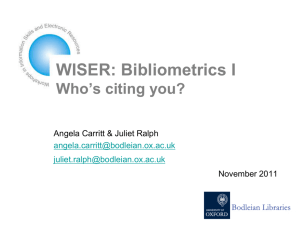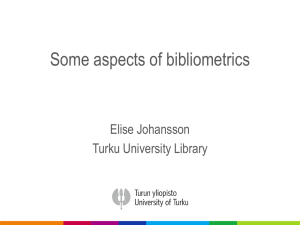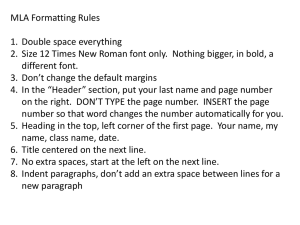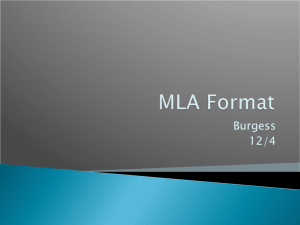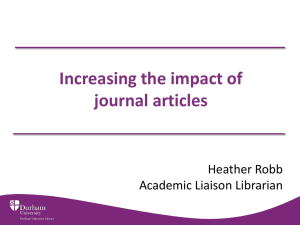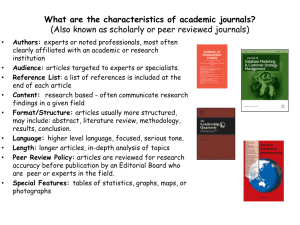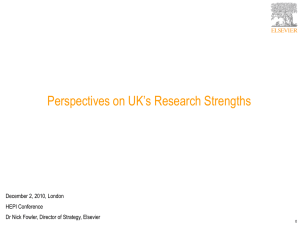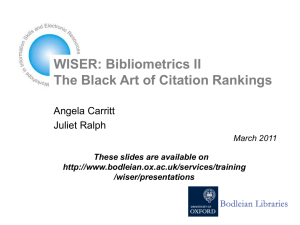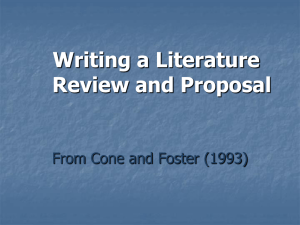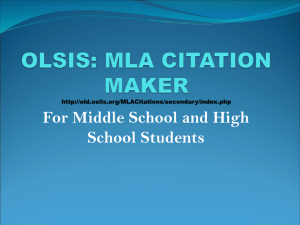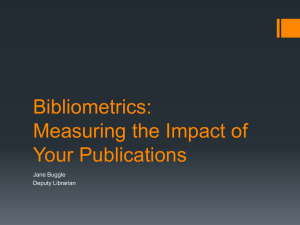Presentation - Bodleian Libraries
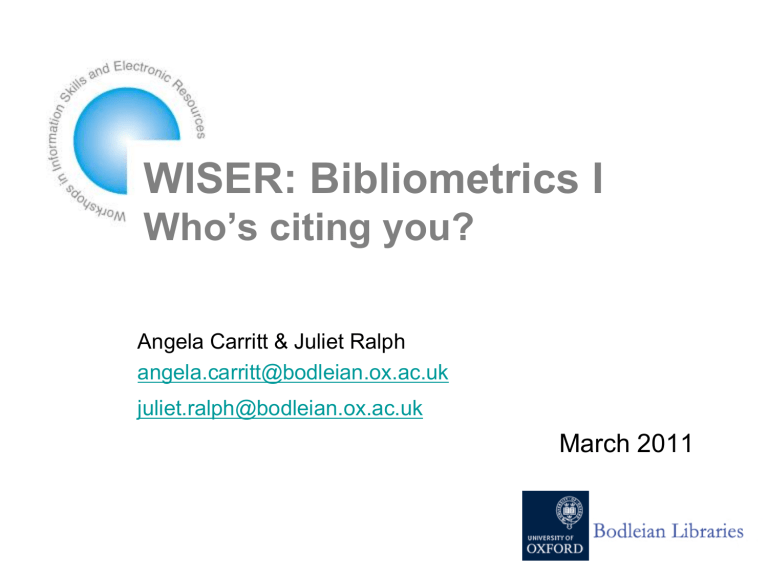
WISER: Bibliometrics I
Who’s citing you?
Angela Carritt & Juliet Ralph angela.carritt@bodleian.ox.ac.uk
juliet.ralph@bodleian.ox.ac.uk
March 2011
In this session
• Citation tracking - what it is and why its important
• Finding out who’s citing you using:
Web of Science
•
•
Scopus
•
Google Scholar.
• Creating citation alerts
Next session
• WISER Bibliometrics II: The Black Art of Citation Ranking more on measuring research impact
Later papers that cite
“your”
{
2009 paper
2010
2010
2008
1980
1870
2007
Papers that share one or more citation in common - related
2006
2008
} Earlier papers referred to in “your” paper
Why bother
• Trace the progress of research backwards, forwards and sideways
• Identify research papers in your field / stay ahead of competitors
• Assess the impact of your research – grants / jobs
Web of Science
• Science Citation Index Expanded (SCI)--1945-present
• Social Sciences Citation Index (SSCI)--1956-present
• Arts & Humanities Citation Index (A&HCI)--1975-present
• Conference Proceedings Citation Index- Science (CPCI-S)-
-1990-present
• Coverage: thousands of journals, conference papers, review papers, notes of meetings, letters, book reviews, art exhibits, poetry…but not books (yet!)
Search example
• Bartsch, R.A. & Cobern, K.M. 2003, "Effectiveness of PowerPoint presentations in lectures", Computers & Education, vol. 41, no. 1, pp. 77.
• Effectiveness of PowerPoint presentations in lectures
• Bartsch, RA & Cobern, KM
• Source: COMPUTERS & EDUCATION Volume:
41 Issue: 1 Pages: 77-86 Published: AUG 2003
• Cited references
• Times cited
General v Cited Reference
• General
•
• quick and easy but may be incomplete
• can also search for book reviews
• Cited Reference search
•
Thorough – picks up variant citations
•
Includes books (cited by papers on WOS)
Includes publications that pre date the citation indexes (cited by WOS)
WoS: Book Citation Index
• Coming soon…second quarter of 2011
• Initially 25,000 book titles
•
Scholarly titles containing original research (not text books etc)
•
• back to 2005 for Sciences back to 2003 for Social Sciences / Humanities
• Includes references, footnotes, bibliographies
Cited references in Scopus
• Huge bibliographic database covering
• 18,000 scholarly journals & conference proceedings in
• Science, Medicine, Social sciences & Humanities
• www.scopus.com
• “View references” displays the article’s bibliography.
• “ Citations ” column indicates times the article was cited
•
• by other articles in Scopus since 1996.
Citations column
NB ‘ since 1996’
Cited references in Google
Scholar
• References include ‘cited by’ data based on articles known to Google Scholar
• Entries ranked by number of cites
• Picks up citations in journals not covered by WoS or
Scopus (especially non-English language), plus conferences, books, dissertations/theses, unpublished items such as Powerpoint shows etc…
• Not possible to sort, save sets or analyse
How did they compare?
• In October 2010:
• Web of Science
•
42 citing articles; 19 unique to WoS
• Scopus
•
45 citing articles; 10 unique to Scopus
• Google Scholar
•
117 citations; 79 unique
•
But beware of phantom citations
• 19 references in common across the 3 databases.
Other databases
• Citing articles are becoming a feature in many databases
•
Historical Abstracts
•
•
•
Medline , Embase , PsycInfo , BIOSIS Previews
…and other life science databases on the Ovid platform
JSTOR
• Full-text databases such as ScienceDirect , Wiley Online
Library
• Number of times it has been cited in that database.
• Look for links such as “Cited by”, “Citing articles”
Citation Alerts in WoS
Get an email next time it’s cited
or set up an RSS feed
Citation Alerts in Scopus
•Also has choice of
•Email alerts
•RSS feeds
Quality or quantity?
• Meho, L. I.; Yang, K. (2007). " Impact of
Data Sources on Citation Counts and
Rankings of LIS Faculty: Web of
Science vs. Scopus and Google
Scholar ".
• Journal of the American Society for
Information Science and Technology 58
(13): 2105 –2125.
• doi : 10.1002/asi.20677
Meho and Yang’s study found that:
•Google Scholar identified more citations than Web of Science and
Scopus combined
• but most of those extra ones were from low-impact journals or conference proceedings.
Coverage compared
• Web of Science - strong coverage of journal publications, but poor coverage of high impact conferences.
• Scopus - better coverage of conferences, but poor coverage of publications prior to 1996.
• Google Scholar - best coverage of conferences and most journals (though not all), but like
Scopus has limited coverage of pre-1990 publications.
Bibliometrics
•If you want to count or analyse your citations or ‘impact’, the tools to use are
•Web of Science
•Scopus
Here to help
• Your Subject Librarian
• www.bodleian.ox.ac.uk/libraries/ subjects/librarians
• Radcliffe Science Library
• www.bodleian.ox.ac.uk/science
• enquiries.rsl@bodleian.ox.ac.uk
Over to you
• Try an online tutorial from the list at www.bodleian.ox.ac.uk/science/training/tutorials
•
Web of Science
• Or do your own search on Web of Science or Scopus
•
Start at SOLO http://solo.bodleian.ox.ac.uk
or OxLIP+ http://oxlip-plus.bodleian.ox.ac.uk
and search for database name

